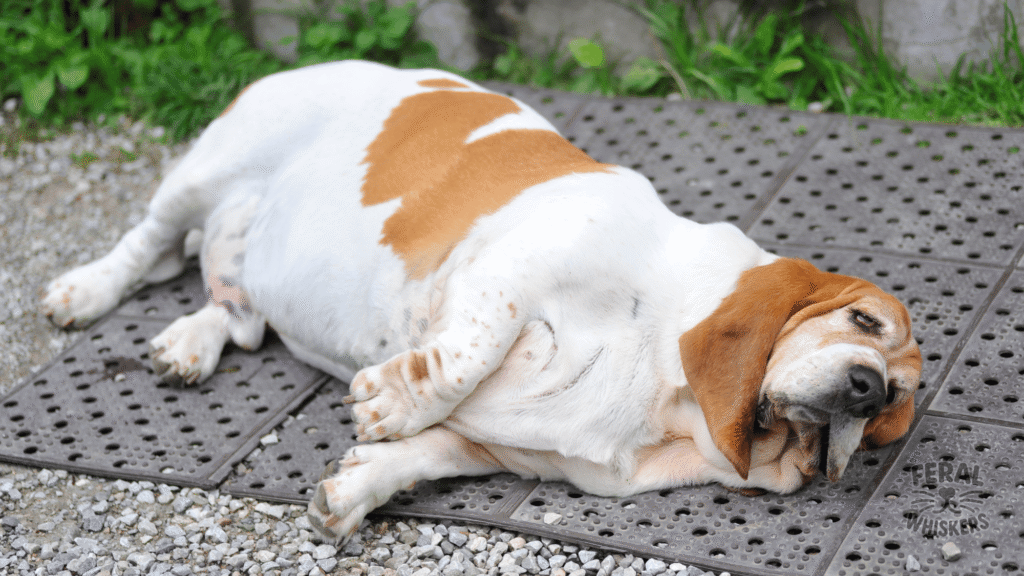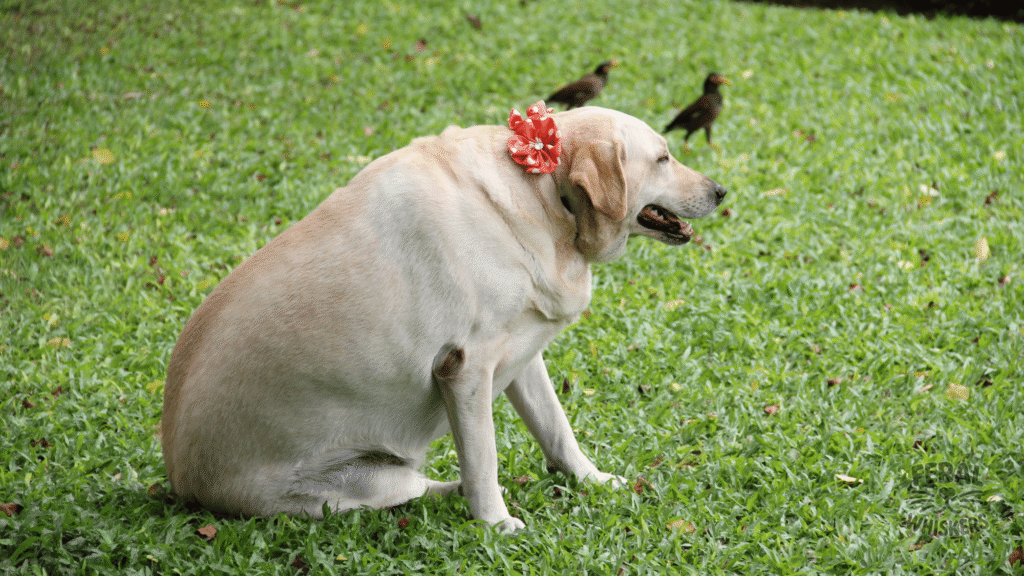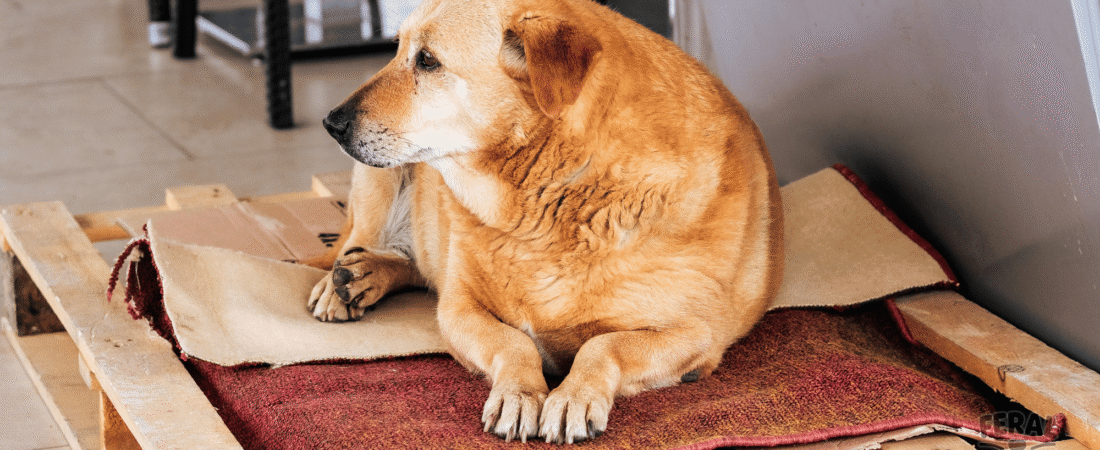📌 Why Obesity is Dangerous for Dogs

Obesity is one of the most common but under-discussed dog health issues. Studies estimate that over 50% of dogs in the U.S. are overweight or obese.
It’s easy to “love” our pups with too many treats, but extra pounds put enormous stress on their joints, organs, and immune systems. Even just 5 extra pounds on a medium-sized dog can significantly increase the risk of:
- Arthritis & mobility decline
- Heart disease & high blood pressure
- Diabetes (especially in certain breeds)
- Shortened lifespan (by 1–2 years)
- Increased risk of cancer
👉 Holistic weight management isn’t about crash diets — it’s about restoring balance through whole foods, exercise, natural metabolism boosters, and mindful feeding habits.
🦠 Causes of Obesity in Dogs
- Overfeeding & Too Many Treats 🍪
- Free feeding or high-calorie biscuits add up quickly.
- Low Quality Diet 🥫
- Processed kibble loaded with fillers (corn, soy) leads to sugar spikes and fat storage.
- Lack of Exercise 🛋️
- Dogs need physical and mental stimulation, not just potty breaks.
- Hormonal or Medical Causes 🧬
- Hypothyroidism or Cushing’s disease can slow metabolism.
- Neutering & Aging ⏳
- Hormonal changes reduce activity while appetite stays the same.
🔎 How to Tell if Your Dog is Overweight

- Look: Can you see a waistline behind the ribs? If not, too heavy.
- Touch: You should feel ribs with light pressure, not buried in fat.
- Observe: Dog tires easily, snores, struggles hopping into car/onto couch.
⚠️ Veterinarians use a Body Condition Score (BCS) ranging from 1 (underweight) to 9 (obese). Ideal = 4–5.
🌿 Holistic Solutions for Dog Weight Management
1. Switch to a Whole-Food, Nutrient-Dense Diet 🍲
Processed kibble and canned foods often contain fillers that provide calories but little nutrition.
✅ Better Choices:
- Home-cooked meals (balanced with lean proteins + veggies).
- Raw diets (if appropriate — consult holistic vet).
- Gently cooked commercial foods with transparent ingredients.
✅ Anti-Inflammatory, Metabolism-Boosting Foods:
- Lean proteins: Turkey, rabbit, white fish.
- Low-glycemic carbs: Pumpkin, zucchini, broccoli, spinach.
- Superfoods: Blueberries (antioxidants), kelp (thyroid support).
- Coconut oil (tiny amounts): Supports metabolism.
⚠️ Avoid: table scraps, fatty meats, bread, high-calorie “junk treats.”
2. Mindful Feeding Practices 🐶🥄
- No free-feeding: Serve meals at set times.
- Measure portions: Follow guidelines, adjust based on activity.
- Limit treats: Max 10% of daily calorie intake. Replace with veggies like carrots or green beans.
- Enrichment feeding: Use slow-feeder bowls, snuffle mats, or frozen Kongs to prolong mealtime, preventing overeating.
3. Exercise: The Natural Fat Burner 🐕🦺
Exercise isn’t only for calorie burning — it boosts circulation, mood, and metabolism.
✅ Best Holistic Exercises:
- Brisk walks: Daily 20–40 mins.
- Swimming: Perfect for overweight or arthritic dogs (no joint strain).
- Agility light: Gentle games, low jumps, tunnels, fetch.
- Treadmill walks: Good for extreme weather climates.
💡 Mental Exercise Burns Calories Too: Puzzle toys, scent tracking, training drills can reduce cortisol and stress-snacking behaviors.
4. Herbs & Natural Metabolism Boosters 🌱
- Dandelion root: Supports liver detox & digestive function.
- Green tea extract (decaf, vet-supervised): Boosts fat metabolism.
- Turmeric (golden paste): Anti-inflammatory, supports joint + metabolism health.
- Cinnamon: Helps regulate blood sugar.
(Always consult a vet before adding herbs, especially with existing conditions.)
5. Holistic Weight Loss Supplements 💊
- L-Carnitine: Helps burn fat into energy.
- Probiotics / Gut support: Balanced microbiome = efficient metabolism.
- Fish oil (Omega-3): Supports fat burning, reduces inflammation linked to obesity.
6. Lifestyle Strategies for Sustainable Weight Loss 🏡
- Routine & consistency: Feed + walk at the same times daily.
- Family agreement: Everyone must follow portion & treat rules.
- Food puzzle toys: Slow eating, prevent gulping calories.
- Water, hydration, fiber: Keeps hunger at bay and supports digestion.
⚠️ Never “starve” a dog for rapid weight loss — it damages metabolism, muscles, and mood.
🐾 Special Considerations
- Senior overweight dogs: Focus on gentle, joint-safe workouts + supplements (glucosamine, omega-3).
- Hypothyroid dogs: Require vet care + specific diet adjustments.
- Multi-dog homes: Feed separately to prevent food theft from thinner siblings.
🚨 When to Seek Professional Help
See a vet if:
- Your dog gains weight despite calorie restrictions.
- Obesity is paired with hair loss, lethargy (possible hypothyroidism).
- Difficulty breathing, inability to walk, or severe lethargy appear.
❓ FAQs
Q1: How fast should my dog lose weight?
Safe weight loss = ~1–3% of body weight per week.
Q2: Are “diet dog foods” from pet stores effective?
Often not — many still contain fillers. Whole-food, balanced diets are better.
Q3: Can I feed raw veggies as snacks?
Yes! Carrots, cucumbers, green beans, zucchini all make great low-cal treats.
Q4: Is obesity more dangerous for large breeds than small?
Yes — excess weight shortens lifespan more drastically in large/giant breeds, but all dogs are affected.
💡 Final Thoughts
Dog obesity is 100% preventable and reversible with holistic care. By combining balanced whole-food diets, mindful feeding, daily movement, and natural supplements, you’ll restore your pup’s energy, protect joints and heart, and extend their healthy years.
✅ Key takeaway: Holistic weight management isn’t about restriction — it’s about balance, vitality, and long-term sustainability.

